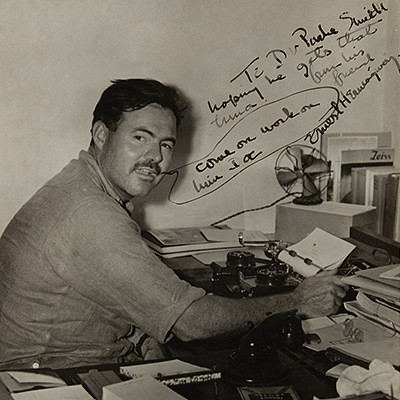F. Scott Fitzgerald Sends a Sharp Letter to His Former Literary Agent
Two ways to bid:
- Leave a max absentee bid and the platform will bid on your behalf up to your maximum bid during the live auction.
- Bid live during the auction and your bids will be submitted real-time to the auctioneer.
Bid Increments
| Price | Bid Increment |
|---|---|
| $0 | $5 |
| $50 | $10 |
| $200 | $25 |
| $500 | $50 |
About Auction
Sep 13, 2023
RR Auction support@rrauction.com
- Lot Description
World War II-dated TLS signed “Scott Fitz,” one page, 8.5 x 11, September 11, 1940. Letter to “Swanie,” his former literary agent H. N. Swanson, in full: “Your office told me that the offer of $200, for the radio rights of ‘The Dance’ came through Harold Ober. I agreed to it with that understanding. The implication of this announcement in the Reporter is that you are still my representative out here. This is emphatically not true. Your preposterous suggestion outside the theatre the other night that I advertise some commercial product is as near as you have come to representing me for almost a year. I must ask you to make no further announcements of this kind.” In fine condition, with light creasing, and staple holes, to the upper left corner.
Accompanied by a copy of Swanson’s measured reply, written six days later, in full: “Answering your note, Harold Ober and our office split a commission on the sale of the radio rights on 'The Dance,' On all sales that we share in we publicize them in the trade papers. Our radio department represents several clients for radio who have other motion picture agents in Hollywood. I am sorry if you misconstrued our intent in publicizing the item.
I hope your letter doesn't mean what it just possibly might mean: that you would not have accepted money from the sale if you had known we were to get a portion of the commission. I like to think that if our radio lads could bring you an offer for the rights of some of your published stories that you would still want us to negotiate for you.
At all events, Scott, I wish you would answer this last question for me. I feel I have known you for a long time and worked for you for a long time just as Harold Ober has. The fact that you are no longer with us as a client shouldn't mean that you misunderstand or mistrust our motives. I will always be a booster of yours. Write me a simple, friendly letter and set me right on this.”
H. N. Swanson was no stranger to strong personalities. He represented some of the finest, and in some cases, obdurate writers of the early 20th century, a list that included Raymond Chandler, William Faulkner, Frank Buck, James M. Cain, Elmore Leonard, and, of course, F. Scott Fitzgerald, who, at this particular time in his life, was finally sober, but likewise laboring to make ends meet. The juxtaposition of tone in the two offered letters speaks volumes: Swanson, calm and conciliatory, Fitzgerald, a potent mixture of offense and defense, the sound of his angry typewriter clacking across the page. The bitterness of Fitzgerald’s language feels brewed from a place of abandonment, relegated to a second-class client while Swanson, at the top of his game, deals with the next big thing. The mention of Harold Ober, Fitzgerald’s other agent, is also of note, given that Ober was as much a friend of Fitzgerald’s as he was a business partner; Ober and his wife, Anne, served as the surrogate parents to Fitzgerald’s daughter, Scottie, and, to his own detriment, Ober made it a custom to lend the author money he would never be reimbursed, a total orbiting around $20,000. Written just three months before his death at the age of 44, this letter offers a poignant glimpse into the latter stages of Fitzgerald’s life and mindset. - Shipping Info
-
Bidder is liable for shipping and handling and providing accurate information as to shipping or delivery locations and arranging for such. RR Auction is unable to combine purchases from other auctions or affiliates into one package for shipping purposes. Lots won will be shipped in a commercially reasonable time after payment in good funds for the merchandise and the shipping fees are received or credit extended, except when third-party shipment occurs. Bidder agrees that service and handling charges related to shipping items which are not pre-paid may be charged to a credit card on file with RR Auction. Successful international Bidders shall provide written shipping instructions, including specified Customs declarations, to RR Auction for any lots to be delivered outside of the United States. NOTE: Declaration value shall be the item’(s) hammer price and RR Auction shall use the correct harmonized code for the lot. Domestic Bidders on lots designated for third-party shipment must designate the common carrier, accept risk of loss, and prepay shipping costs.
-
- Buyer's Premium



 EUR
EUR CAD
CAD AUD
AUD GBP
GBP MXN
MXN HKD
HKD CNY
CNY MYR
MYR SEK
SEK SGD
SGD CHF
CHF THB
THB













